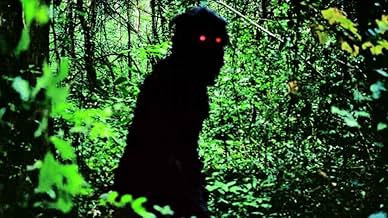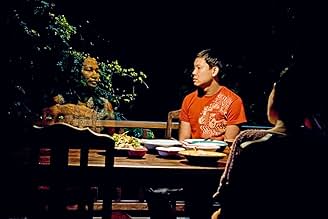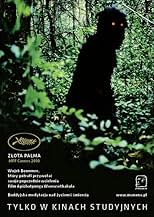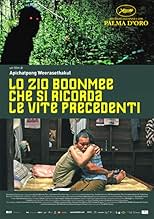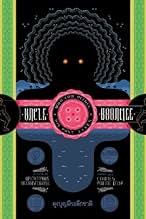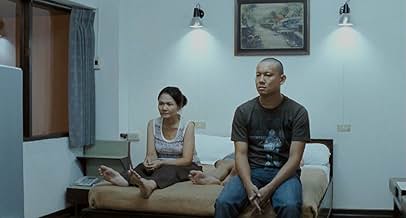IMDb रेटिंग
6.7/10
18 हज़ार
आपकी रेटिंग
अपनी भाषा में प्लॉट जोड़ेंDying of kidney disease, a man spends his last, somber days with family, including the ghost of his wife and a forest spirit who used to be his son, on a rural northern Thailand farm.Dying of kidney disease, a man spends his last, somber days with family, including the ghost of his wife and a forest spirit who used to be his son, on a rural northern Thailand farm.Dying of kidney disease, a man spends his last, somber days with family, including the ghost of his wife and a forest spirit who used to be his son, on a rural northern Thailand farm.
- पुरस्कार
- 11 जीत और कुल 25 नामांकन
Kanokporn Tongaram
- Roong
- (as Kanokporn Thongaram)
- …
कहानी
क्या आपको पता है
- ट्रिवियाShot on 16mm film rather than digital. Director Apichatpong Weerasethakul wanted to film in this format as the film is all about dying traditions.
- गूफ़The first time a ghost appears, during dinner, the nephew passes the ghost a glass of water. You can see the ghost image superimposed over the nephew's arm when he places the glass of water on the table.
- कनेक्शनFeatured in At the Movies: Cannes Film Festival 2010 (2010)
फीचर्ड रिव्यू
This movie is meditation, a state of concentration. I only wish I wasn't tired when I saw it last night because my concentration waned, I could feel the movie slipping between my fingers and trying to wilfully sustain the experience can't work. This is a Buddhist film, but it's Thai Buddhist (the form they practice in Thailand came from Sri Lanka and is from the earliest strata of Buddhism), it's spiritual but it's not esoteric in the manner of the Tibetans, ancient but not arcane. It's not Buddhist because Boonmee may or may not be recalling on his deathbed his past and future lives, or because there are ghosts and demons and a talking catfish, this is colorful lore, the illusory flowers of mind. It's Buddhist because it's aware of the moment. Not so strangely, it's the fantastical bits that seem to make the film watchable for most people, yet if we come to this film to satisfy our need for something to happen, we break the spell. The spell here for me is the awareness of life as is, the clear vision of a heaven in the present world.
Here's a camera that doesn't describe a world, it allows it to emerge in its own time. Sometimes this tests my patience but I appreciate that it doesn't make amends and concessions. Cessation, stillness of mind, true perception, these are all vital and desirable here, and they can only happen in their own time, they can't be forced. I appreciate that and I appreciate the limitations of my own viewing. In those moments that my eyes and the movie adjust, I am blissful. Two moments exemplify this, the one is a table out in the verandah by night, insects buzzing around a light and everything is quiet, this is the summer night for me. The other is Uncle Boonmee lying down on a bed in his honeykeeping shed, it's noon and crickets are humming from the trees, this is the summer day. It reminds me of the remembrance of spring in Kiarostami's The Wind Will Carry Us.
The finale is rather interesting, despite the above. A lot of viewers seem to regard it as Weeresethakul's comment on the alienation fostered by the niceties of modern society. It is its own comment on the place of Buddhism in one such society, where the garments of the monk mean nothing, but instead of inferring that a day's hard work out in the open is preferable to watching TV Weeresethakul could have not made a movie to begin with (that calls for us to sit alone from one another in a dark room where flickering lights are projected).
But I don't think that such a simple conclusion was what was intended. I see vision that wants to encompass the world of ambiguities. The family may be sitting in the silent, staring at a box, but I got the sense of quiet warmth coming from the simple togetherness, a certain soothing affect that is possible only in people who can sit together without a need for words. Who can relax simply in the presence of each other.
This is valuable work, and I believe it will be cherished by viewers who feel the chakras of cinema should be purified and set ablaze now and then.
Here's a camera that doesn't describe a world, it allows it to emerge in its own time. Sometimes this tests my patience but I appreciate that it doesn't make amends and concessions. Cessation, stillness of mind, true perception, these are all vital and desirable here, and they can only happen in their own time, they can't be forced. I appreciate that and I appreciate the limitations of my own viewing. In those moments that my eyes and the movie adjust, I am blissful. Two moments exemplify this, the one is a table out in the verandah by night, insects buzzing around a light and everything is quiet, this is the summer night for me. The other is Uncle Boonmee lying down on a bed in his honeykeeping shed, it's noon and crickets are humming from the trees, this is the summer day. It reminds me of the remembrance of spring in Kiarostami's The Wind Will Carry Us.
The finale is rather interesting, despite the above. A lot of viewers seem to regard it as Weeresethakul's comment on the alienation fostered by the niceties of modern society. It is its own comment on the place of Buddhism in one such society, where the garments of the monk mean nothing, but instead of inferring that a day's hard work out in the open is preferable to watching TV Weeresethakul could have not made a movie to begin with (that calls for us to sit alone from one another in a dark room where flickering lights are projected).
But I don't think that such a simple conclusion was what was intended. I see vision that wants to encompass the world of ambiguities. The family may be sitting in the silent, staring at a box, but I got the sense of quiet warmth coming from the simple togetherness, a certain soothing affect that is possible only in people who can sit together without a need for words. Who can relax simply in the presence of each other.
This is valuable work, and I believe it will be cherished by viewers who feel the chakras of cinema should be purified and set ablaze now and then.
- chaos-rampant
- 17 जन॰ 2011
- परमालिंक
टॉप पसंद
रेटिंग देने के लिए साइन-इन करें और वैयक्तिकृत सुझावों के लिए वॉचलिस्ट करें
- How long is Uncle Boonmee Who Can Recall His Past Lives?Alexa द्वारा संचालित
विवरण
- रिलीज़ की तारीख़
- कंट्री ऑफ़ ओरिजिन
- आधिकारिक साइटें
- भाषाएं
- इस रूप में भी जाना जाता है
- Uncle Boonmee Who Can Recall His Past Lives
- फ़िल्माने की जगहें
- उत्पादन कंपनियां
- IMDbPro पर और कंपनी क्रेडिट देखें
बॉक्स ऑफ़िस
- US और कनाडा में सकल
- $1,84,292
- US और कनाडा में पहले सप्ताह में कुल कमाई
- $23,540
- 6 मार्च 2011
- दुनिया भर में सकल
- $12,14,424
- चलने की अवधि1 घंटा 54 मिनट
- रंग
- ध्वनि मिश्रण
- पक्ष अनुपात
- 1.85 : 1
इस पेज में योगदान दें
किसी बदलाव का सुझाव दें या अनुपलब्ध कॉन्टेंट जोड़ें



